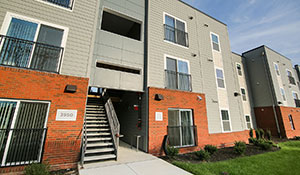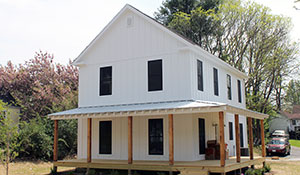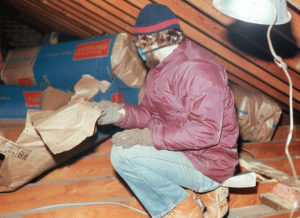October 1, 2020
Virginia resident William Adams had been living with a damaged roof and a long list of maintenance needs for years before he reached out to Community Housing Partners (CHP).
“When I figured out how much it was going to cost me to get the house fixed, I couldn’t afford that,” he said. “I called around to different agencies trying to find help to get my house worked on and everything until CHP came out and looked at it.”
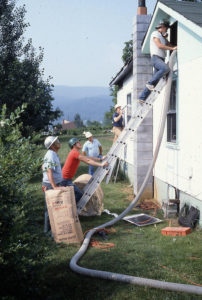
An early example of weatherization from what is now CHP Energy Solutions
When CHP Weatherization team members first visited his home, they knew that they needed to work with others to find Adams a new place to live. CHP Property Management sprang into action to find Adams a new home at Hunting Hills Apartments in Blacksburg, Virginia, while CHP Homeownership came up with a plan for selling his old home.
“I feel more safe living where I am now,” Adams said. “I appreciate all the help they gave me.”
Adams is one of more than 457,000 people that CHP has helped with a healthy, affordable place to call home since the organization’s establishment 45 years ago—an anniversary milestone that CHP is celebrating in 2020.
“Throughout our 45 years of service, CHP has had a tremendous impact on residents and clients across the Southeast and Mid-Atlantic,” said Janaka Casper, Chief Executive Officer at CHP. “This wouldn’t be possible without the support of our valuable partners and the incredible work of CHP staff who carry out our mission of creating homes and communities that are healthy, sustainable, and affordable.”
CHP has more than 350 employees with an undeniable impact across six states. In 2019 alone, the organization provided stable rental housing to 11,274 people, delivered services to 2,878 residents, and prepared 285 clients for homeownership. It also invested more than $61 million in homes that meet green standards, weatherized 6,081 homes, and trained 833 building science professionals.
“As a mission-driven nonprofit, we measure our success not just through our bottom line, but also through the transformations we see in the lives of our residents and clients every day,” Casper added. (Watch a video of this transformation in action to support Adams.)
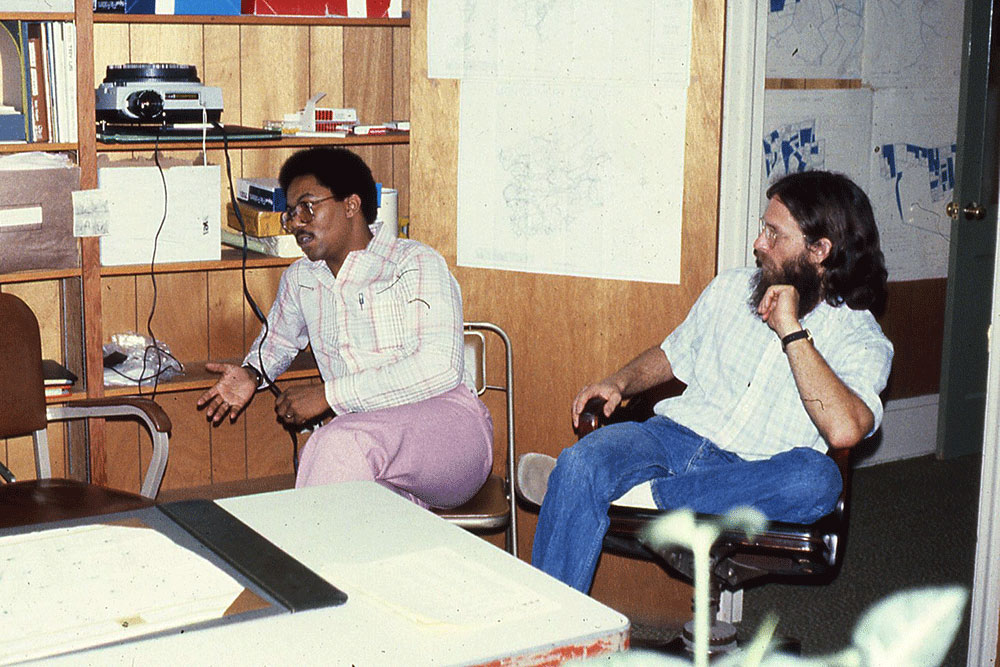
Janaka Casper (right) joined the organization in the 1970s.
Through the Decades
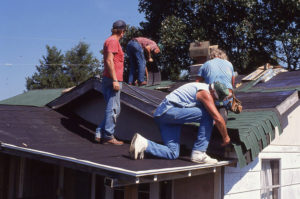
Project Home Repair works on a roof in Ironto, Virginia.
CHP was founded in 1975 by two concerned citizen activists—Rev. Woody Leach and Emily Stuart—who organized volunteer college students and faculty in Blacksburg, Virginia, to perform minor home repairs for low-income families living in unsafe or unhealthy conditions. Known as Project Home Repair, the group soon began offering weatherization services, which were delivered by a small team of professional staff. As the complexity of the repairs grew, the organization changed its name to Virginia Mountain Housing and received a 501(c)(3) nonprofit designation. (Read more about CHP’s founding and history.)
In the 1980s, the company continued to grow, adding rental housing preservation, Class-A general contracting, property management, and homeownership and realty programs. Virginia Mountain Housing also expanded outside of the New River Valley, launching an indoor plumbing initiative and providing contract weatherization services to other nonprofits.
“We started the weatherization program in the mid-1970s for rural homes in the New River Valley,” said Casper, who explained that CHP has now weatherized more than 50,000 homes. “Today, we are proud to continue this program as the largest nonprofit weatherization provider in Virginia.” (Watch a video spotlight on the history of CHP Weatherization.)
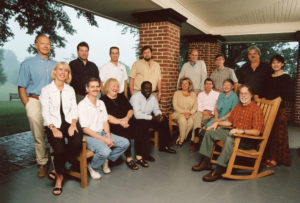
Employees gather in Richmond, Virginia, for a staff retreat in the 1990s.
The company shortened its name to VMH in the 1990s to reflect a more geographically diverse service area. In addition to purchasing several multifamily rental communities in Florida, it founded a residential treatment center and school for at-risk youth. In 1997, CHP created the Resident Services program, an organization-wide network that combines human services with economic development programming to assist low-income families in overcoming commonly faced obstacles.
During this time, VMH also began offering training and research in residential energy conservation techniques, home performance testing, and heating and cooling equipment diagnostics and repair. This became known as the New River Center for Energy Research and Training (NRCERT).
With a new millennium came additional changes. The board and staff renamed the organization once again to Community Housing Partners and added new lines of business. Among these was a subsidiary community development financial institution (CDFI) named New Enterprises Fund. This fund eventually spun off into a separate company called Virginia Community Capital, which continues to promote economic development today. Similarly, the CHP Design Studio was established to offer architectural services to CHP and external, like-minded clients. This award-winning, full-service design firm was nationally recognized throughout its 15 years of service at CHP and has now become Arnold Design Studio.
In 2010, NRCERT became the CHP Energy Solutions Research and Training Center with the opening of a new, 12,500-square-foot training facility in Christiansburg to provide hands-on energy-efficiency training to participants all over the world. Since its establishment, the Training Center has reached more than 36,000 students across the U.S., Canada, and Latin America.
A Hopeful Future
CHP has continued to evolve in recent years, offering new programs and services and expanding its geographic reach. It now has more than 100 apartment communities in six states and has invested more than $648 million in real estate development over the years.
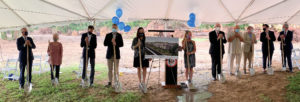
CHP and project partners broke ground on the Residences at North Hill in Fairfax County, Virginia, earlier this year.
This year, the organization broke ground on the Residences at North Hill in Fairfax County, Virginia, and will soon finish a community transformation at J. Van Story Branch Apartments in Baltimore, Maryland. It also earned CORES Certification, which recognizes organizations that have developed the necessary infrastructure to deliver high-quality resident services across their affordable housing portfolios.
Like other organizations around the country, CHP has also faced challenges with the current public health crisis. Since March, the organization has been implementing new health and safety protocols to protect residents, clients, and vendors. Even though the pandemic has impacted CHP’s day-to-day operations, the organization is continuing to fulfill its mission in new and innovative ways. These include new lines of communication with residents, new forms of program delivery, and expanded online training opportunities.
“Although COVID-19 has had a significant effect on how we carry out our mission, it has also brought renewed attention on the importance of home,” Casper said. “That’s what we do best at CHP: we provide healthy, sustainable homes for people who need them, and we look forward to doing so for the next 45 years.”
